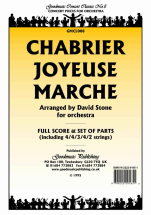Joyeuse Marche
Buy this item (in stock)
Product ID: GM1 CL008
By Emmanuel Chabrier
published: 1888
Publisher:
Goodmusic
Arranger:
Stone
Series:
Concert Classics
Genre:
Romantic Era
Line Up:
Symphony Orchestra
Duration:
4:00
Level: 3
Set & Score
This item is in stock
About this item
The parts are fully cued so that the arrangement may be played by strings only, or strings and piano with any available wind and percussion.
Instrumentation
Flute 1, Piccolo (or Flute 2), Oboe, 2 Clarinets in Bb, Bassoon 2 Horns in F, 2 Trumpets in Bb, 3 Trombones, Timpani, Percussion (Side drum, Triangle, Bass drum & Cymbals) Strings (Violin 1, Violin 2, Viola, Cello, Bass) Piano (optional)
Reviews and rating
No review available, be the first to write one!

Composer
Emmanuel Chabrier (1841-1894)
Emmanuel Chabrier (pronounced: [ɛmanɥɛl ʃabʁie]) (January 18, 1841 – September 13, 1894) was a French Romantic composer and pianist. Although known primarily for two of his orchestral works, España and Joyeuse marche, he left an important corpus of operas (including the increasingly popular L'étoile), songs, and piano music as well. These works, though small in number, are of very high quality, and he was admired by composers as diverse as Debussy, Ravel, Richard Strauss, Satie, Schmitt, Stravinsky, and the group of composers known as Les six. Stravinsky alluded to España in his ballet Petrushka, Ravel wrote that the opening bars of Le roi malgré lui changed the course of harmony in France, Poulenc wrote a biography of the composer, and Richard Strauss conducted the first staged performance of Chabrier's incomplete opera Briséïs.
Chabrier was also associated with some of the leading writers and painters of his time. He was especially friendly with the painters Claude Monet and Édouard Manet, and collected Impressionist paintings before Impressionism became fashionable. A number of such paintings from his personal collection are now housed in some of the world's leading art museums.
More info about the composer...



 Click above to view samples
Click above to view samples
